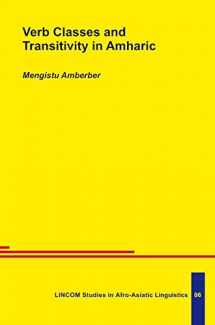
Verb Classes and Transitivity in Amharic
ISBN-13:
9783895864049
ISBN-10:
3895864048
Author:
Mengistu Amberber
Publication date:
2002
Publisher:
LINCOM publishers
Format:
Paperback
FREE US shipping
Book details
ISBN-13:
9783895864049
ISBN-10:
3895864048
Author:
Mengistu Amberber
Publication date:
2002
Publisher:
LINCOM publishers
Format:
Paperback
Summary
Verb Classes and Transitivity in Amharic (ISBN-13: 9783895864049 and ISBN-10: 3895864048), written by authors
Mengistu Amberber, was published by LINCOM publishers in 2002.
With an overall rating of 3.5 stars, it's a notable title among other
books. You can easily purchase or rent Verb Classes and Transitivity in Amharic (Paperback) from BooksRun,
along with many other new and used
books
and textbooks.
And, if you're looking to sell your copy, our current buyback offer is $0.38.
Description
The book provides a detailed analysis of verb classes and transitivity alternations in the Ethiosemitic language Amharic. It investigates the lexical-semantic and morphosyntactic properties of a number of constructions including causatives, passives, applicatives, and experiencer predicates. The lexical semantic analysis of the verbs appeals to the theory of Conceptual Semantics as developed by Ray Jackendoff. Thus, the study assumes a decompositional approach to the meaning of lexical items in which the meaning of a given lexical item is decomposed into smaller universal conceptual primitives. Each chapter begins with a succinct introduction of the Amharic data under investigation and a concise statement of the theoretically relevant issues. Then the Amharic data is analysed within a cross-linguistic context in order to uncover deep and underlying grammatical properties. The book would interest theoretical and descriptive linguists studying the interface between lexical semantics and morphosyntax. As it explores the relationship between conceptual structure and language, the book would also be of interest to psycholinguists and researchers interested in the mental lexicon.


We would LOVE it if you could help us and other readers by reviewing the book
Book review

Congratulations! We have received your book review.
{user}
{createdAt}
by {truncated_author}


